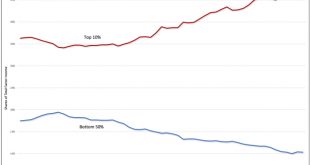by New Deal democrat Weekly Indicators for December 10 -14 at Seeking Alpha My Weekly Indicators post is up at Seeking Alpha. A decline in mortgage rates unsurprisingly appears to have caused a rush in applications to lock in those rates. Plus one more anomaly ….
Read More »The Wizard of Odds
Dorothy was in a strange land and had no idea what would happen next. The good witch of the North said she should follow the scientific method to a sound forecast. Unfortunately, neither she (nor anyone else) explained what exactly the scientific method is. As she wandered down the yellow brick forking path of endless options, Dorothy was surprised by the voice of a heuristic firmly attached to a degenerate prior. She freed the heuristic from the prior...
Read More »MasterCard, Bill Gates and their “war on cash”
from Norbert Haering and the current issue of RWER If people write about a war on cash, even well-meaning readers will tend to think of them as doomsayers with paranoid tendencies. However, many will have second thoughts if they hear that there is indeed a Better Than Cash Alliance, which has the goal of replacing cash by digital payments on a global scale, and that this Alliance is doing this with the explicit support of the government of the 20 most powerful countries. The term “war on...
Read More »Econometrics — analysis with incredible certitude
from Lars Syll There have been over four decades of econometric research on business cycles … But the significance of the formalization becomes more difficult to identify when it is assessed from the applied perspective … The wide conviction of the superiority of the methods of the science has converted the econometric community largely to a group of fundamentalist guards of mathematical rigour … So much so that the relevance of the research to business cycles is reduced to empirical...
Read More »Hickel response on degrowth
from Dean Baker [This is the last piece in an exchange with Jason Hickel on growth.My last piece is here.] Baker says “I am at a loss to understand why we would have a war on growth.” I don’t know why he is at a loss. I explained the reasons for this in my previous post. There are two I focus on. (1) Because growing the GDP means growing energy demand, and this makes the task of switching to renewable energy significantly more difficult (nearly three times more difficult between now...
Read More »Open thread Dec. 14, 2018
Brexit: The endgame
On 29 March this year[1,2], if nothing else changes, the UK will leave the European Union under the terms of Article 50. Unsurprisingly, lots of scenarios are being scripted, but the one I see as most likely doesn’t seem to be among them. I expect that nothing much will happen until about 28 March. May won’t get a deal that can pass through Parliament. If she allows a vote at all, it won’t be until late January and it won’t pass. At that point, or possibly before, Labor will try a...
Read More »Dollarization in the United States
from David Ruccio The United States is increasingly becoming dollarized. That’s because, for decades now, those at the bottom have been left behind, forced to attempt to get by in ever more precarious conditions. If you asked mainstream economists what dollarization means, they would immediately define it as a country officially adopting the currency of another for financial transactions. Often, of course, that currency has been the U.S. dollar, as was the case for Ecuador in January...
Read More »Your model is internally consistent? So what!
from Lars Syll ‘New Keynesian’ macroeconomist Simon Wren-Lewis has a post on his blog discussing how evidence is treated in modern macroeconomics (emphasis added): The unique property that DSGE models have is internal consistency. Take a DSGE model, and alter a few equations so that they fit the data much better, and you have what could be called a structural econometric model. It is internally inconsistent, but because it fits the data better it may be a better guide for policy. Being...
Read More »Trade: It’s still about class, not country
from Dean Baker While Donald Trump keeps taking wild shots in his trade wars with China and other countries, the media have been cheering him on in at least one aspect of his campaign. All the elite types agree that “we” have an interest in clamping down on China’s alleged theft of our intellectual property. While some “we” might share that interest, most of the country does not. Just to be clear on the agenda here, the alleged theft takes three forms. The first is what passes for actual...
Read More » Heterodox
Heterodox



